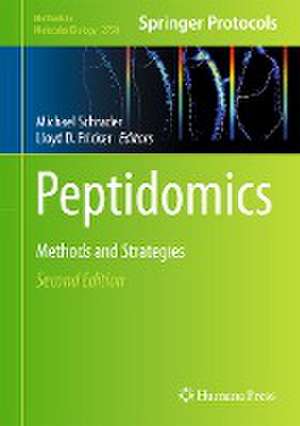Peptidomics: Methods and Strategies: Methods in Molecular Biology, cartea 2758
Editat de Michael Schrader, Lloyd D. Frickeren Limba Engleză Hardback – 29 mar 2024
Authoritative and up-to-date, Peptidomics: Methods and Strategies, Second Edition serves as an ideal guide for state-of-the-art approaches in this vital field.
Din seria Methods in Molecular Biology
- 9%
 Preț: 791.59 lei
Preț: 791.59 lei - 23%
 Preț: 598.56 lei
Preț: 598.56 lei - 20%
 Preț: 882.95 lei
Preț: 882.95 lei -
 Preț: 252.04 lei
Preț: 252.04 lei - 5%
 Preț: 802.69 lei
Preț: 802.69 lei - 5%
 Preț: 729.61 lei
Preț: 729.61 lei - 5%
 Preț: 731.43 lei
Preț: 731.43 lei - 5%
 Preț: 741.30 lei
Preț: 741.30 lei - 5%
 Preț: 747.16 lei
Preț: 747.16 lei - 15%
 Preț: 663.45 lei
Preț: 663.45 lei - 18%
 Preț: 1025.34 lei
Preț: 1025.34 lei - 5%
 Preț: 734.57 lei
Preț: 734.57 lei - 18%
 Preț: 914.20 lei
Preț: 914.20 lei - 15%
 Preț: 664.61 lei
Preț: 664.61 lei - 15%
 Preț: 654.12 lei
Preț: 654.12 lei - 18%
 Preț: 1414.74 lei
Preț: 1414.74 lei - 5%
 Preț: 742.60 lei
Preț: 742.60 lei - 20%
 Preț: 821.63 lei
Preț: 821.63 lei - 18%
 Preț: 972.30 lei
Preț: 972.30 lei - 15%
 Preț: 660.49 lei
Preț: 660.49 lei - 5%
 Preț: 738.41 lei
Preț: 738.41 lei - 18%
 Preț: 984.92 lei
Preț: 984.92 lei - 5%
 Preț: 733.29 lei
Preț: 733.29 lei -
 Preț: 392.58 lei
Preț: 392.58 lei - 5%
 Preț: 746.26 lei
Preț: 746.26 lei - 18%
 Preț: 962.66 lei
Preț: 962.66 lei - 23%
 Preț: 860.21 lei
Preț: 860.21 lei - 15%
 Preț: 652.64 lei
Preț: 652.64 lei - 5%
 Preț: 1055.50 lei
Preț: 1055.50 lei - 23%
 Preț: 883.85 lei
Preț: 883.85 lei - 19%
 Preț: 491.88 lei
Preț: 491.88 lei - 5%
 Preț: 1038.84 lei
Preț: 1038.84 lei - 5%
 Preț: 524.15 lei
Preț: 524.15 lei - 18%
 Preț: 2122.34 lei
Preț: 2122.34 lei - 5%
 Preț: 1299.23 lei
Preț: 1299.23 lei - 5%
 Preț: 1339.10 lei
Preț: 1339.10 lei - 18%
 Preț: 1390.26 lei
Preț: 1390.26 lei - 18%
 Preț: 1395.63 lei
Preț: 1395.63 lei - 18%
 Preț: 1129.65 lei
Preț: 1129.65 lei - 18%
 Preț: 1408.26 lei
Preț: 1408.26 lei - 18%
 Preț: 1124.92 lei
Preț: 1124.92 lei - 18%
 Preț: 966.27 lei
Preț: 966.27 lei - 5%
 Preț: 1299.99 lei
Preț: 1299.99 lei - 5%
 Preț: 1108.51 lei
Preț: 1108.51 lei - 5%
 Preț: 983.72 lei
Preț: 983.72 lei - 5%
 Preț: 728.16 lei
Preț: 728.16 lei - 18%
 Preț: 1118.62 lei
Preț: 1118.62 lei - 18%
 Preț: 955.25 lei
Preț: 955.25 lei - 5%
 Preț: 1035.60 lei
Preț: 1035.60 lei - 18%
 Preț: 1400.35 lei
Preț: 1400.35 lei
Preț: 1676.75 lei
Preț vechi: 2044.81 lei
-18% Nou
Puncte Express: 2515
Preț estimativ în valută:
320.84€ • 334.33$ • 265.66£
320.84€ • 334.33$ • 265.66£
Carte tipărită la comandă
Livrare economică 03-17 aprilie
Preluare comenzi: 021 569.72.76
Specificații
ISBN-13: 9781071636459
ISBN-10: 1071636456
Ilustrații: XIV, 506 p. 86 illus., 67 illus. in color.
Dimensiuni: 178 x 254 mm
Greutate: 1.12 kg
Ediția:2nd ed. 2024
Editura: Springer Us
Colecția Humana
Seria Methods in Molecular Biology
Locul publicării:New York, NY, United States
ISBN-10: 1071636456
Ilustrații: XIV, 506 p. 86 illus., 67 illus. in color.
Dimensiuni: 178 x 254 mm
Greutate: 1.12 kg
Ediția:2nd ed. 2024
Editura: Springer Us
Colecția Humana
Seria Methods in Molecular Biology
Locul publicării:New York, NY, United States
Cuprins
Origins, Technological Advancement, and Applications of Peptidomics.- Two Different Strategies for Stabilization of Brain Tissue and Extraction of Neuropeptides.- Mass Spectrometric De Novo Sequencing of Natural Peptides.- Data-Independent Acquisition Peptidomics.- Quantitative Peptidomics: General Considerations.- Quantitative Peptidomics Using Reductive Methylation of Amines.- Label-Free Quantitation of Endogenous Peptides.- Bioinformatics for Prohormone and Neuropeptide Discovery.- Integrating a Multi-Label Deep Learning Approach with Protein Information to Compare Bioactive Peptides in Brain and Plasma.- Methods for Intracellular Peptidomic Analysis.- Neuropeptidomics of Genetically Defined Cell Types in Mouse Brain.- Non-Targeted Identification of d-Amino Acid-Containing Peptides through Enzymatic Screening, Chiral Amino Acid Analysis, and LC-MS.- Albumen and Yolk Plasma Peptidomics for the Identification and Quantitation of Bioactive Molecules and the Quality Control ofHen Egg Products.- An Updated Guide to the Identification, Quantitation, and Imaging of the Crustacean Neuropeptidome.- Strategy for the Identification of Host-Defense Peptides in Frog Skin Secretions with Therapeutic Potential as Antidiabetic Agents.- Peptidomics of Zebrafish Brain in a 6-OHDA-Induced Neurodegeneration Model.- Analysis of the Snake Venom Peptidome.- Identification of Peptides in Spider Venom Using Mass Spectrometry.- Identification and Targeted Quantification of Endogenous Neuropeptides in the Nematode Caenorhabditis elegans Using Mass Spectrometry.- Intracellular and Extracellular Peptidomes of the Model Plant, Physcomitrium patens.- The Strategy for Peptidomic LC-MS/MS Data Analysis: The Case of Urinary Peptidome Study.- Peptidomics Strategies to Evaluate Cancer Diagnosis, Prognosis, and Treatment.- Mass Spectrometry-Based Immunopeptidomics of Peptides Presented on Human Leukocyte Antigen Proteins.- Profiling Human Cerebrospinal Fluid (CSF) EndogenousPeptidome in Alzheimer's Disease.- Deep Learning-Assisted Analysis of Immunopeptidomics Data.- Current Challenges and Future Directions in Peptidomics.
Textul de pe ultima copertă
This updated edition explores essential techniques and newly emerged applications used in the expanding field of peptidomics. The opening chapters describe sample preparation and basic techniques. Subsequent chapters delve into quantitative peptidomics, bioinformatics, deep learning approaches, non-human model organisms, and peptide toxins. The last section includes multiple chapters on applications of peptidomics for human clinical specimens. Written for the highly successful Methods in Molecular Biology series, chapters include overviews and introductions to their respective topics, lists of the necessary materials, reagents, and instrumentation, step-by-step and readily reproducible laboratory protocols, and tips on troubleshooting and avoiding known pitfalls.
Authoritative and up-to-date, Peptidomics: Methods and Strategies, Second Edition serves as an ideal guide for state-of-the-art approaches in this vital field.
Caracteristici
Includes cutting-edge techniques Provides step-by-step detail essential for reproducible results Contains key implementation advice from the experts
